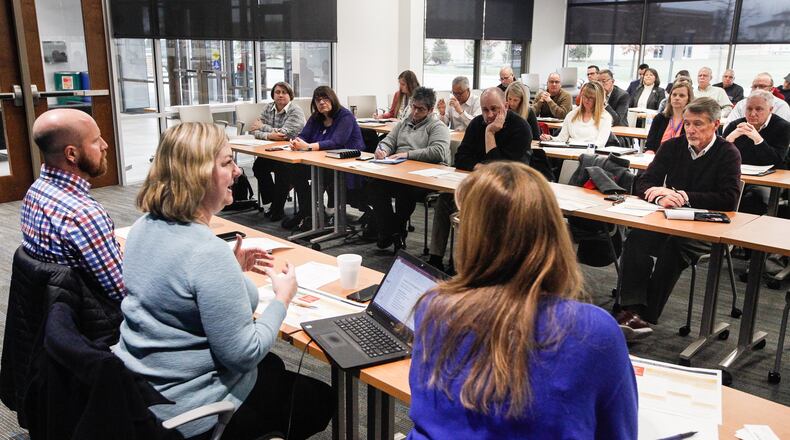UPDATE: Diary found after tornado ‘going home’
A meeting Thursday drew about 50 officials from storm-hit jurisdictions, nonprofits, public health and utilities suppliers. The effort seeks to make sure repair projects aren’t mired in red tape when volunteers arrive to tackle projects, said Laura Mercer, director of the Miami Valley Long-Term Recovery Operation Group.
“This is the first step on pulling that together on a major scale,” Mercer said. “We need to have 40-50 jobs lined up by the March-April time frame, ready to roll when teams come in.”
About 650 individuals or families have been entered into a disaster case management system for those unable to recover on their own using insurance or other means. About half the cases are homeowners, Mercer said.
“We expect there will be somewhere between 300 and 500 homes that we will do substantial repairs on or do rebuilds for,” she said.
It’s important to have plans approved as soon as possible so skilled workers don’t sit idle, said John Pyron, who is heading the repair-and-rebuild effort for the recovery group.
“If we can line some of these things up beforehand, when volunteers come in we can have a stack of projects that are appropriately case-managed, they’ve been vetted, they’ve been funded, they have everything they need,” he said. “All they need now is labor to do that work to get those families home.”
MORE: Local housing options needed for disaster volunteers
In Ohio, a record 16 tornadoes touched down on the western side of the state Memorial Day night. Locally, tornadoes caused damage across three counties and nine jurisdictions.
Some of the communities have different building codes, diverse zoning and an array of development plans which could complicate the ability of volunteer rebuilders, Schweikhart said.
“Permitting and inspection is complicated case-by-case. We know that,” she said.
Other circumstances can complicate rebuilding, including if property taxes are in arrears, whether the project requires lead or asbestos abatement, or the home sits above a water protection area.
Pyron said the group is working toward hiring a construction coordinator and construction manager to help smooth the way for volunteer groups.
“Those two positions will help manage the universe of what this rebuild and repair effort is going to look like,” said Pyron, who also serves as the director of disaster response for Lutheran Social Services of Central Ohio.
Volunteer groups — most faith-based organizations aligned with the National Voluntary Organizations Active in Disaster — will provide a bulk of the labor that is not covered by FEMA grants or insurance, Pyron said. Groups coming for a week or so at a time — visits they hope will occur over the next couple of years — shouldn’t have to worry about a project’s permit status, he said.
Maury Wyckoff, Montgomery County’s chief building official, said the county has had to hire consultants to meet a 64% increase in residential plan reviews last year. Some of the new activity was attributed to a strong economy, but much was due to tornado damage, he said.
“We are inundated with projects. Our line of plans to be reviewed is fairly long,” he said. “We spend a lot of time in the building department just explaining to people what has to be on a set of drawings. It’s a brand-new thing for reluctant applicants who didn’t want to be involved in this process, but we’re thrown into it.”
Part of the backlog is due to the attrition of qualified building personnel, Wyckoff said.
“Inspectors and plan examiners are highly skilled, state certified people. You can’t just pull in somebody to do this who’s not certified or not a licensed architect or engineer,” he said. “There’s a need statewide for more inspectors, more plan examiners, more building officials.”
In addition to its townships, Montgomery County also handles inspections for tornado-hit towns of Brookville, Clayton, Riverside and Trotwood. The county already has three-way mutual aid agreement with Dayton and Kettering as well as individual agreements with Centerville and Vandalia.
With a staff working six-day weeks, Wyckoff said he is looking for help beyond those agreements.
“We are still open for suggestions on ways to provide additional assistance,” he said.
MORE: Tornado recovery resource guide
Tornado survivors who need more help to rebuild or repair their property should call 211 and get entered into the case management system, Schweikhart said.
“It’s really important to get them in the 211 system and do it now so the teams have the time to work their case and get them ready to potentially have their project on the slate for this spring or summer,” she said.
Were you impacted by tornadoes and still need help?
Call 211 on Monday through Friday between 8 a.m. and 5 p.m. to be connected to a tornado assistance operator who will screen you to assess your needs, and can connect you to a case manager to help you navigate available resources. If 211 is not available in your area, call 937-225-3000 or the toll-free number 855-405-7629.
About the Author

